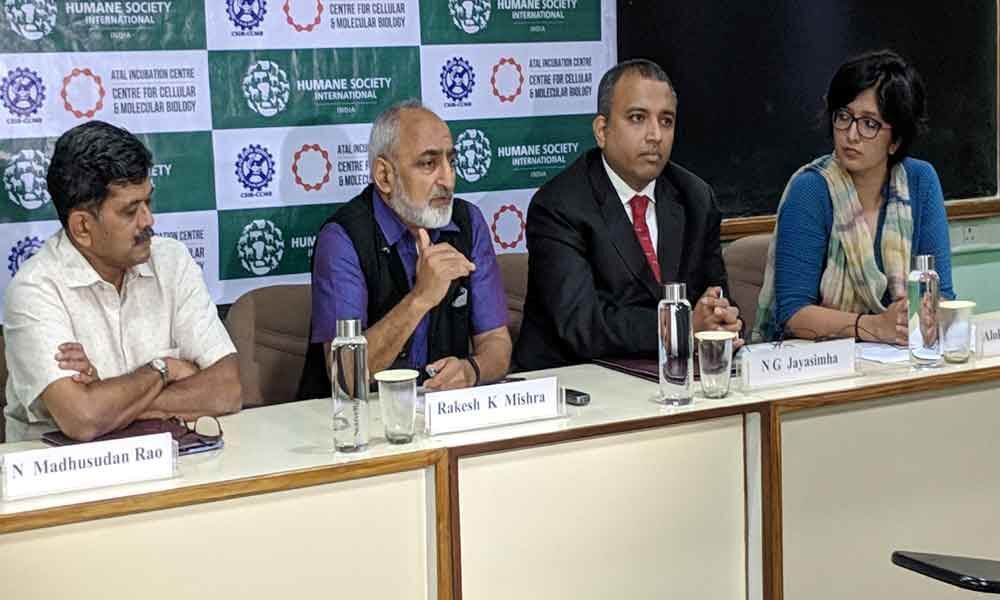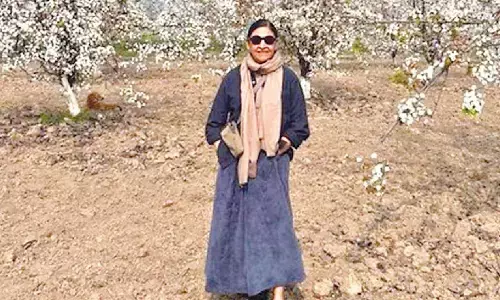CCMB bats for alternatives to animal testing
 (From left) Dr Madhusudhan Rao, CEO AIC-CCMB, Dr Rakesh Mishra, Director of CCMB, NG Jayasimha, MD of HSI- India, and Alokparna Sengupta, Deputy Director, HSI-India
(From left) Dr Madhusudhan Rao, CEO AIC-CCMB, Dr Rakesh Mishra, Director of CCMB, NG Jayasimha, MD of HSI- India, and Alokparna Sengupta, Deputy Director, HSI-IndiaAtal Incubation Centre (AIC) at the Centre for Cellular and Molecular Biology (CCMB) in collaboration with Humane Society International-India (HSI-India) launched the Centre for Predictive Human Model systems at the Centre for Cellular and Molecular Biology (CCMB) here on Thursday.
Hyderabad: Atal Incubation Centre (AIC) at the Centre for Cellular and Molecular Biology (CCMB) in collaboration with Humane Society International-India (HSI-India) launched the Centre for Predictive Human Model systems at the Centre for Cellular and Molecular Biology (CCMB) here on Thursday. The center will be a dedicated facility to enable a paradigm shift in science by focusing on 21st century new approach methodologies instead of animal models.
The centre aims at prioritizing investment in human-based, non-animal methodologies in life sciences research in India. It seeks to establish a multi-stakeholder think-tank that represents the growing body of expertise on new approach methodologies on a scientific and policy level, keeping in mind the 21st century biomedical science and toxicology motive globally to break siloes. It will also forge a partnership among the scientific community for better flow of knowledge, support for research and open-access publication of literature will be focused upon.
Researchers have been critically assessing the validity and reliability of data obtained from animal experimentation to predict human outcomes and develop a better understanding of human physiology. New approach methodologies that do not involve the use of live animals are demonstrating more human relevance and thus promise improved outcomes for human health protection and medical interventions.
This collaboration envisions a future for India to be a key player in 21st century biomedical and toxicology research through investment, capacity building, and policy-level changes. "This center is a natural alignment to AIC's objective of supporting new innovation and technologies. This sector of predictive human biology is ripe of investment and I am certain that this partnership with HIS-India will kindle the much-needed investment in this field," said Dr Madhusudan Rao, CEO of AIC–CCMB.
"We are very excited about the collaboration which has helped to establish the center. With the uniqueness that the center brings, we endeavor to plug the loopholes that the health research faces. We aim for this center to be the pioneer in promoting advanced, accurate and reliable science which is also more ethical" said Alokparna Sengupta, Deputy Director at HSI/India
The collaboration comes at an appropriate time during the 'World Laboratory Animal Week'. While the use of animals for research and testing dates back decades, science has progressed to a point where computational models and in-vitro models have been developed that are not only resource-friendly with reduced costs but also more accurate at predicting human outcomes and are ethical.
Last year with HIS/India and other organisations, the CCMB initiated a process towards finding alternatives to the animal in various contexts. "With 90 to 92 per cent failure in animal models, we understood they are not completely reliable but we still used them for years. Using the human model that is testing the same drugs on human stem cells will give us more reliable results and will also reduce the production cost," informed Rakesh Mishra, Director of CCMB, Hyderabad.










